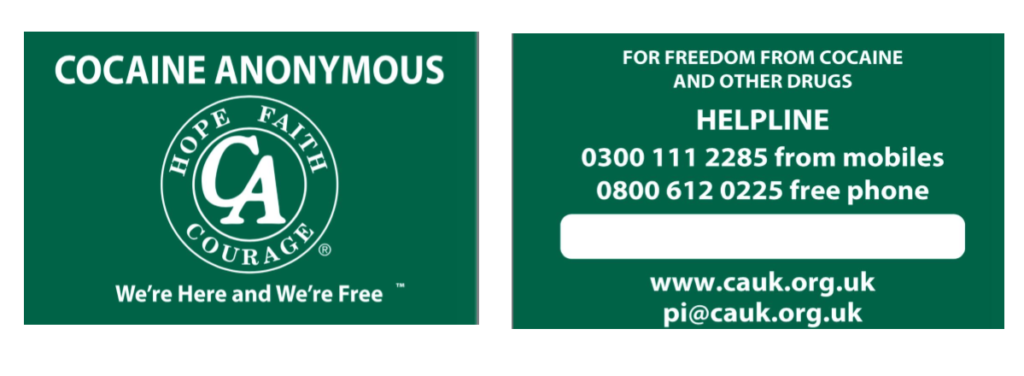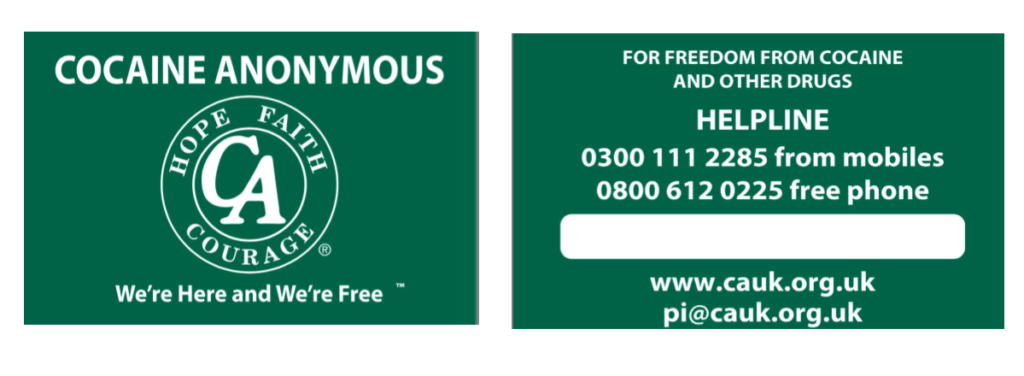The Chit System
Cocaine Anonymous Chit System
• Although we are an anonymous fellowship, we realize some members may benefit from being able to provide evidence of attendance at meetings.
• We also appreciate the positive impact this can have with our Cooperation with Professional Communities work (CPC).
THE CHITS DO NOT CONFIRM ATTENDEES ARE CLEAN, SPONSORED OR WORKING A PROGRAMME
They simply confirm that they attended the meeting from start to finish.
What do ‘Chits’ look like?

The question of Anonymity
• Rather than a member signing a card, most groups favor the use of a stamp, with the meeting name.
• Then the Chit can include a written date.
How the Chit System works at group-level?
• A group member is chosen to be the designated ‘Chit coordinator’
• The coordinator role can be voted in as with any other group post can be tied into another post.
• Any attendees of the group can request evidence of attendance and are directed to the group Chip coordinator.
• At the end of the meeting, the Chit coordinator gives attendees a card stamped and dated.
• The Chit coordinator reiterates to member that the Chit card is not a proof of being clean, being sponsored, or working a programme, but simply evidence of attending a meeting on the date signed.
Other considerations for groups
• The following announcement may be read at the start of the meeting:
“This meeting offers chits for those members needing to provide evidence of attendance. Our chits are not evidence of being clean, being sponsored or working a programme. They simply prove attendance from beginning to the end of this meeting. Please can the Chit coordinator please raise their hand.”
How the Chit System works for professional communities?
• A client or service user who may benefit from attending Cocaine Anonymous is identified.
• The professional person downloads the local meeting list.
• The client or service user is asked to attend meetings. They should inform the meeting secretary they require to collect a chit.
• At the end of the meeting, the client or service user will collect the chip stamped and dated from the group Chit coordinator.
• The client or service user can then use the chit card as proof of attendance.
Examples of people who may require Chits
• People with upcoming court dates
• Parents working with social services to arrange access / contact with children
• People in treatment who need to prove where they have been whilst out of the facility
• People trying to secure funding for treatment programmes
This is not an exhaustive list; members are free to use them as they see fit.
Why are we using standard C.A. business cards?
• We chose to stick with business cards, rather than a chit sheet as may be used in other mutual aid groups mainly for ease of access. Most groups and / or districts will already be using business cards for PI service so it’s not some newfangled complicated thing that we need to store somewhere online, to be downloaded and printed etc
• “BUT!!! You’re using standard CA BUSINESS CARDS… What if someone just steals cards, say from a doctors surgery where we leave them for Public Information”?
• Ok.. so this is where having a bit of faith in our fellowship comes in.
• In order for a new member to discover what our chit system looks like, they need to come to at least one meeting, right?
• We have every faith that at that first meeting they will hear a message of depth and weight that will interest and hold them; they will meet some recovered addicts who are able to offer hope and fellowship; and they will want to return, rather than go and find a doctors surgery where PI have dropped off business cards and steal them all.
• The meeting stamp will also be difficult (but not impossible) to replicate – back to having faith in fellowship.
The question of affiliation…
But doesn’t this affiliate us with outside organisations?
• A large part of PI service work is about developing cooperative relationships with professional communities.
• The Chit System has been developed with the question of affiliation firmly in mind, which is how we settled on using our own business cards, rather than signing an organisation’s ‘official’ document, which could imply affiliation. By using our own business cards, we feel we are avoiding this issue whilst remaining cooperative to the requirements from professional communities.
• Members in receipt of chits are free to use them however they need to, we are not endorsing or aligning ourself with any outside organisation.
The origins of the Chit System idea
Why are we even doing this?
• Over the past few years, several attendees at meetings have asked if we can provide evidence of attendance at meetings for court dates, social services and / or probation services, not as a requirement of any DTO or similar, just because as an individual, they want to prove that they have been attending meetings.
• In addition Professional Communities, in particular the Criminal Justice Services are starting to encourage 12-step fellowship attendance to their clients.
• As other fellowships are already in a position to offer different types of chit system, we wanted to make sure that people in this position were freely able to choose C.A. as an option.
Interesting notes
• The CAUK PI committee has discussed this over a number of years A LOT!!
• We considered many different approaches, affiliation issues, anonymity issues, etc..
• Then we discussed it some more… and some more!!
• One day our PI chair was doing her H&I service in a prison when a prisoner said ‘hey Miss, can I have one of those cards to show the judge I’ve been coming?’
• God just gave us our solution to our Chit System dilemma!!
To summarise…
• CAUK adopted this system around a year ago.
• Approximately 60% of meetings, in the participating districts, have adopted this system.
• Several attendees are collecting chits for varying reasons.
• If you need any more information or guidance please don’t hesitate to contact CAUK PI chair (Pi@cauk.org.uk).
